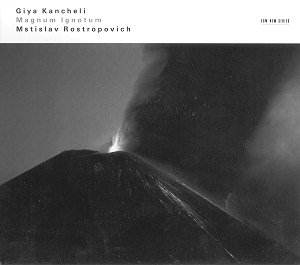GIYA KANCHELI (b.1935)
Simi - Joyless Thoughts for cello and orchestra
[28.10]
Magnum Ignotum
[22.28]
 Royal Flanders PO/Jansug
Kakhidze
Royal Flanders PO/Jansug
Kakhidze
 ECM NEW SERIES ECM 1669
462 713-2
[50.38]
ECM NEW SERIES ECM 1669
462 713-2
[50.38]
Crotchet

The sound favoured by ECM is unglamourised but conveys the impression of
weight and fidelity. A pugnacious lack of glamour also characterises their
black and white sleeve designs.
Kancheli, Tbilisi born, studied with Iona Tuskiya graduating from Tbilsi
Conservatory in 1963. His Fourth Symphony won the State Prize in 1976. He
left his homeland impelled by the winds of violent change that swept through
Georgia in the early 1990s. After three years in Berlin he moved to his present
base in Antwerp in 1994.
Kancheli glowers at and around the margin of tonality. He does not stray
very far- witness the unequivocal tranced tonality of the closing three minutes.
With a subtitle like that, Simi, soulfully played by Rostropovich is what
you might expect. It takes as its apparent point of departure the darker
reaches of Sibelius 4 and ploughs a slow furrow into even more tenebrous
realms. Tragedy spills from Rostropovich's bow. This work could easily partner
Frank Bridge's Oration. Simi, by the way, is Georgian for 'trembling string'.
At 10.29 and 16.20 the gloom is lit by the twilight of a ghostly silky tendril
of melody limned by cello and piano This rises to a series of brief, belligerent
and thunderous statements for full orchestra. These are shot through with
Petterssonian and Shostakovich-like elements: furious and caustic. Rostropovich
writes that Kancheli's music should be played as slowly as possible. The
great 'inscape' spaces evoked by this music are comparable with the even
broader canvas of Valentin Silvestrov's Fifth Symphony (still available on
BMG-Melodiya) and Arvo Pärt's Cantus.
Magnum Ignotus (The Great Anonymous) is for wind ensemble and
tape. The tape track uses a priest reading in the cathedral of Anchiskhati,
a 1930s recording of three elderly West Georgian men singing a polyphonic
improvisation and the vocal ensemble Rustawi singing Uphalo Ghmerto
(Holy God) over the dead iron chatter of stilled bells.
The slowed passage of time and the suggestion of eternity is here no cipher
for monotony. It is the musical equivalent of a dear and trusted friend's
whisperings carried on a web of Bachian melisma and long held notes akin
to the music of John Tavener. The ensemble comprises: flute, 2 oboes, 2
clarinets, 2 bassoons, 2 french horns and double bass. There is nothing bluff
or hearty about this music: vintage Kancheli. An acrid thoughtful nostalgia
breathes mistily over these pages. Only towards the end of the long central
passage for the band alone does the material slow to a pace where a reflection
shudders towards collapse.
Both works are conducted by Janzug Kakhidze who has premiered all the Kancheli
symphonies and whose recordings of four of them (3-6) are on the all too
reticent Olympia label (OCD 401 and OCD 403) and a single disc collection
of 6 and 7 on SONY SMK 66590. The conductor is a close associate of the composer
and has been since the 1950s. Kancheli is fortunate in such a constant 'flame'.
Two minor caveats: playing time is short and the notes while probing and
authoritative do not give essentials like the date of each composition. Otherwise
the sombre and sincere eloquence of this disc is totally compelling.
Rob Barnett

